MARKET OVERVIEW
The global biodegradability testing market caters to the urgent necessity of industries to embrace environmentally friendly practices. In a world where environmental awareness is not just a fad but an international mandate, companies are increasingly being compelled to legitimize the environmental footprint of their products. This market is a pivotal element in the overall endeavor to pursue industrial progress while maintaining ecological integrity.
Biodegradability checking out techniques vary, from ordinary exams which includes OECD 301 and ASTM D6400 to particularly designed tests that suit precise industries or the ones set by means of regional regulatory government. This range of diversity attests to the dynamic nature of the market, as it responds to the precise desires of diverse industries. In packaging, agriculture, or the pharmaceutical enterprise, the global biodegradability testing market provides a number of solutions to decide the compatibility of various materials within the surroundings.
For customer intelligence and regulatory oversight, the global biodegradability testing market holds a critical function in helping firms navigate the complicated terrain of sustainability. With clients increasingly calling for transparency and environmental options, companies don't have any choice however to bank on stringent trying out to aid their inexperienced credentials. Further, regulatory agencies across the globe are clamping down on green standards, calling for comprehensive biodegradability testing to conform.
The importance of the global biodegradability testing market goes beyond being a simple checkbox on the regulatory compliance checklist. It is a driver of innovation in product development and material science. Industries in the race for green solutions look to biodegradability testing not only as a means of achieving compliance but also as a way of how far they can go in designing products that are in harmony with nature.
The global biodegradability testing market is a changing and essential field in today's environmental stewardship and corporate accountability landscape. Its diverse application in allowing businesses to substantiate their green claims, conform to standards, and catalyze innovation makes its importance in today's world where the search for sustainable methodologies is no longer optional but mandatory. With industries transforming towards more eco-friendly ways of working, the global biodegradability testing market is a keystone that ensures that advancement goes hand in hand with keeping our world's sensitive ecological balance intact.
Global biodegradability testing market is estimated to reach $344.0 Million by 2032; growing at a CAGR of 5.9% from 2025 to 2032.
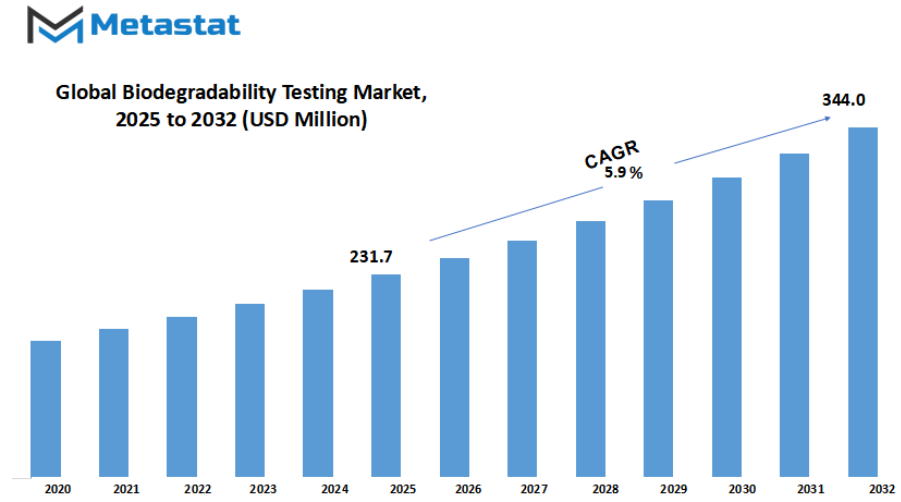
GROWTH FACTORS
During the biodegradability testing, a number of key factors are influencing the market. There is a growing tide of environmental concerns and increasing pollution and waste management worries that have fueled the fire of interest in biodegradable products. There is also a growing demand for green and sustainable options in the market.
Yet, things are not entirely smooth for the biodegradability testing market. Threats loom, such as the lack of standard test methods and regulations. This non-uniformity has the potential to pose obstacles for the sector. Also, low awareness and comprehension of biodegradability testing across many industries and consumers are challenges in their own right.
Amid these difficulties, there is a glimmer of hope for market growth. Innovation is the game. Developing cutting-edge and innovative biodegradability testing methods is the key to crossing hurdles and driving market growth. It guarantees profitable possibilities over the next few years.
The global biodegradability testing market is steered by the compelling need for environmental awareness, pollution concerns, and the requirement of sustainable products. However, it is challenged in the mode of standardized testing procedures and gaps in awareness. Its success lies in the hands of innovation and the development of means of biodegradability testing, with a promising future for the market.
MARKET SEGMENTATION
By Type
The global biodegradability testing market is differentiated by test types, each of which is an important factor in determining the biodegradability of substances. Each test gives information on how certain substances are decomposed in different environments. Three of the most prevalent test segments in this market are the Closed Bottle Test, Manometric Respirometry Test, and Biodegradability in Seawater.
The Closed Bottle Test, worth 77.0 USD Million in 2025, is a test employed to establish the biodegradability of products in the absence of oxygen. For the test, an airtight container or "closed bottle" is employed to provide an environment lacking oxygen. This replicates situations in locations like landfills in which materials smash down inside the absence of oxygen. They take a look at detecting the decrease in oxygen content material of the sealed bottle as a measure of biodegradation. It is mainly beneficial in determining how a cloth biodegrades under situations wherein oxygen tiers are confined. The Manometric Respirometry Test, worth 108.9 USD Million in 2025, is a dynamic method to degree biodegradability.
It entails measuring the charge of respiration of microorganisms while they are metabolizing a test object. The pressure upward push because of the discharge of carbon dioxide throughout microbial increase is quantified. This technique is used to determine the volume of performance with which microorganisms can degrade a substance, that's crucial in understanding biodegradability in cardio systems. It may additionally mimic conditions encountered in wastewater treatment flowers and soil. Biodegradability in Seawater, well worth 45.8 USD Million in 2025, offers the biodegradation of products in marine environments. This is particularly relevant because the environmental have an effect on substances that become inside the oceans and coastal waters.
Breaking down how substances degrade in seawater is vital in determining their impact on the environment. Biodegradation tests in seawater generally observe alterations inside the chemical makeup and physical form of a substance as it makes touch with marine microbes and environmental factors. global biodegradability testing market includes exclusive varieties of testing strategies, all specialized to determine how the materials degrade in positive situations. Closed Bottle Test is useful to comprehend anaerobic biodegradation, Manometric Respirometry Test evaluates cardio biodegradability, and Biodegradability in Seawater examines maritime. All these tests help us to better understand how materials affect the environment and how sustainable decisions are made across multiple industries.
By Application
The global biodegradability testing market is gaining greater attention as governments and industries move towards green solutions. As environmental pollution has become a growing concern, there is a greater requirement to verify that materials must degrade naturally without harming ecosystems. Biodegradability testing is the yardstick for testing whether products are safe to release back into the environment. With waste management remaining one of the largest global challenges, this market will be of utmost importance in defining policies and assisting businesses to adjust to more stringent sustainability standards.
The usage of biodegradability tests is primarily categorized into plastic, paper, and others, each holding special significance. Plastics, one of the most serious concerns in environmental pollution, falls under heavy scrutiny in these tests. From product packaging to consumer products, companies are seeking methods of substituting traditional plastics with products that meet the biodegradability tests. With paper, testing serves to ensure that it degrades optimally and leaves no toxic residues. Paper products feature prominently across packaging, labels, and prints, making their certification important to businesses keen on showcasing green practices.
The "others" include a broad range of products that require verification, such as textiles, detergents, and certain industrial products. As awareness is created, even small industries are becoming interested in certification that confirms their products are not contributing to long-term waste issues. The wider use of testing is indicative of a future when sustainability will no longer be a specialist operation but a normal expectation across most industries. For companies, clearing these tests will not only be a matter of compliance but also of building consumer confidence in markets which prioritize environmental responsibility.
In the future, the global biodegradability testing market will continue to grow as the regulations are tightened, and consumers increasingly demand green products. Those companies that invest in green innovations and testing certifications will most likely be the leaders in industry growth. With plastics, paper, and other products all going through rigorous assessment, biodegradability testing will continue to be an essential component of preventing advancements in manufacturing at the expense of the world.
|
Forecast Period |
2025-2032 |
|
Market Size in 2025 |
$231.7 million |
|
Market Size by 2032 |
$344.0 Million |
|
Growth Rate from 2025 to 2032 |
5.9% |
|
Base Year |
2024 |
|
Regions Covered |
North America, Europe, Asia-Pacific Green, South America, Middle East & Africa |
REGIONAL ANALYSIS
The global biodegradability testing market, an important element of our sustainability-conscious era, plays a major part in determining the environment-friendliness of different products and materials. The impact of this market spreads wide and far, with geographical segments that drive its path. The global Biodegradability Testing industry, according to geography, can be precisely divided into two prominent regions: North America and Europe. These two regions are different but interconnected parts of the market.
North America, with its strong commercial base and environmental conservation dedication, is a distinguished pressure in the global biodegradability testing market. The continent has seen the emergence of some of the leading industries including pharmaceuticals, agriculture, and packaging, all of which can be stakeholders within the biodegradability checking out marketplace. The attention on sustainable processes and green consciousness has led to accelerated demand for biodegradability checking out offerings.
Across the Atlantic, Europe, pushed by its strict regulatory environment and high desire for inexperienced practices, has also made excellent strides in the global biodegradability testing market. European countries have for lengthy diagnosed with minimizing their footprint on the environment, and this has been pondered in a energetic marketplace for biodegradability testing services. The area's emphasis on growing circular economies and sustainable manufacturing strategies has similarly spurred the uptake of such trying out.
The global biodegradability testing market dynamics in North America and Europe are decided via numerous factors. These elements involve regulatory rules, client cognizance, and government-enterprise collaborations. Furthermore, for the reason that the world financial system is becoming more incorporated, quality practices and knowledge sharing between these markets have an important role to play in determining the future path of the global biodegradability testing market.
The significance of biodegradability testing cannot be emphasized enough. It is an essential tool when assessing the environmental impact of products to ensure materials employed in industries are aligned with sustainability objectives. Accordingly, the Biodegradability Testing industry in North America and Europe remains on the move and growing, all while contributing a significant part of the world's effort to establish a more sustainable world.
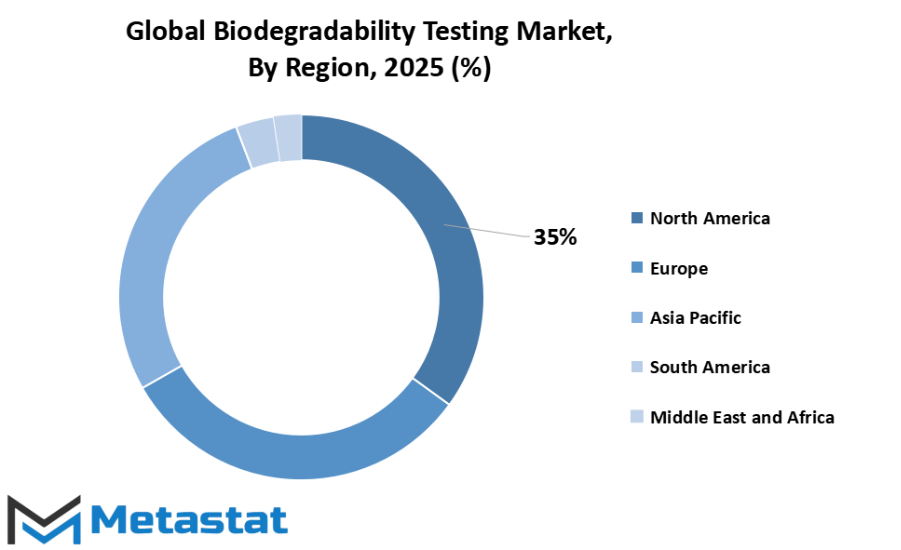
COMPETITIVE PLAYERS
The global biodegradability testing market has been increasing in significance as industries and governments increasingly emphasize sustainability. Companies in packaging, textiles, agriculture, and consumer goods are increasingly under pressure to guarantee that the materials they utilize will not adversely affect the environment over time. Biodegradability testing is crucial in ensuring that products degrade safely, minimizing waste buildup and effect on the environment. With increased demand for environmentally friendly solutions, the market for testing is on the rise, with possibilities for businesses that can deliver timely, accurate, and reliable results.
When it comes to biodegradability testing, it is the major players that count. Top players in this market are AIMPLAS, Anacon Laboratories, Centre Testing International Group (CTI), Enviro Remediation & Research Laboratory (ERRL), Eurofins Scientific, Hohenstein Group, Intertek Group plc, ISEGA Forschungs, JRF Global, and Mérieux NutriSciences Corporation. Along with them, Nautilus Environmental Company, Inc., Normec OWS, Northeast Laboratories, RespirTek, Inc., SATRA Technology, SGS S.A., Shenzhen Hongcai Testing Technology Co., Ltd., Smithers, TÜV Austria Holding AG, TÜV Rheinland, UL LLC, and Woods End Laboratories are still influencing the market. All of these competitors are equipped with distinct expertise and resources, be it sophisticated laboratory equipment, scientific acumen, or solid regulatory networking, which reinforces the authenticity of their offerings.
The diversity of such many companies points toward the importance that biodegradability testing has gained across the globe. Not only do these companies offer testing for international standard compliance, but they also aid in product development for businesses, enabling them to design materials that will fulfill sustainability objectives from the very beginning. Their function goes beyond testing itself since numerous of them also offer certification and advice, facilitating industries to embrace green practices with certainty. Through collaboration with manufacturers, they make sure that the process of changing over to environmentally sound production becomes both pragmatic and reliable.
In the future, the global biodegradability testing market will keep expanding as environmental consciousness rises and tougher regulations are implemented. Such firms will have a determining influence in shaping industry responses to the call for sustainable materials. The knowledge and innovation that firms like Eurofins Scientific, Intertek, SGS, and TÜV Rheinland bring to the table will inspire the use of greener practices among businesses to increase, so that biodegradability testing becomes not only a compliance but also a necessary step toward constructing a cleaner and safer world for everyone.
Biodegradability Testing Market Key Segments:
By Type
- Closed Bottle Test
- Manometric Respirometry Test
- Biodegradability in Seawater
By Application
- Plastic
- Paper
- Others
Key Global Biodegradability Testing Industry Players
- AIMPLAS
- Anacon Laboratories
- Centre Testing International Group (CTI)
- Enviro Remediation & Research Laboratory (ERRL)
- Eurofins Scientific
- Hohenstein Group
- Intertek Group plc
- ISEGA Forschungs
- JRF Global
- Mérieux NutriSciences Corporation
- Nautilus Environmental Company, Inc.
- Normec OWS
- Northeast Labortories
- RespirTek, Inc.
- SATRA Technology
- SGS S.A.
- Shenzhen Hongcai Testing Technology Co., Ltd.
- Smithers
- TÜV Austria Holding AG
- TÜV Rheinland
- UL LLC
- Woods End Laboratories
WHAT REPORT PROVIDES
- Full in-depth analysis of the parent Industry
- Important changes in market and its dynamics
- Segmentation details of the market
- Former, on-going, and projected market analysis in terms of volume and value
- Assessment of niche industry developments
- Market share analysis
- Key strategies of major players
- Emerging segments and regional growth potential



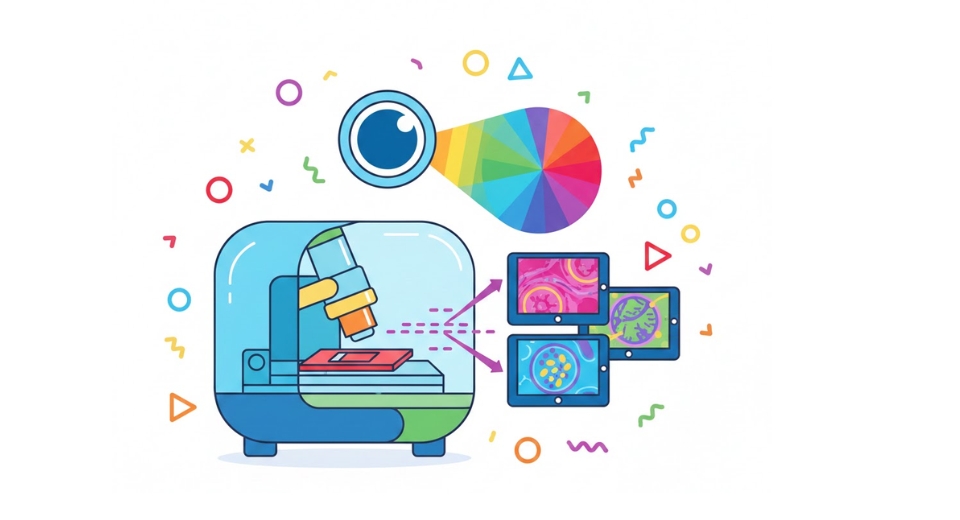
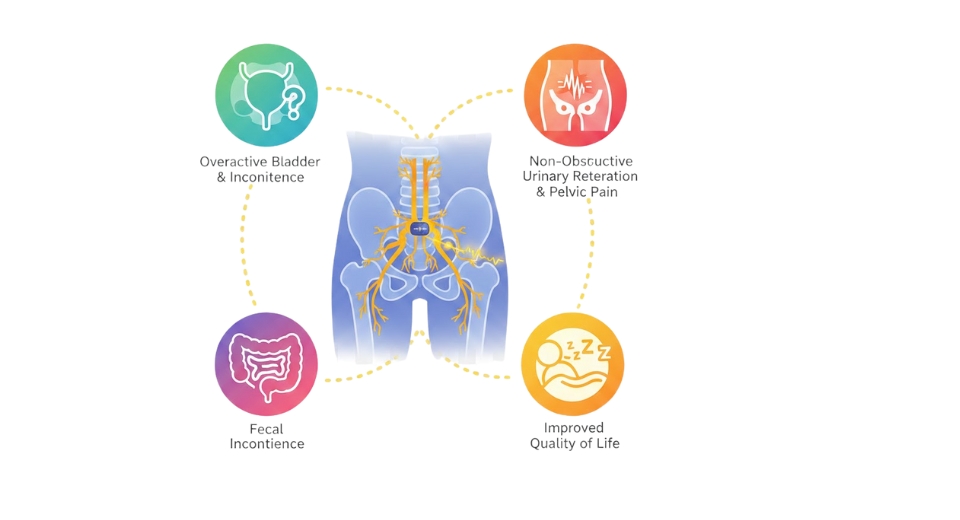
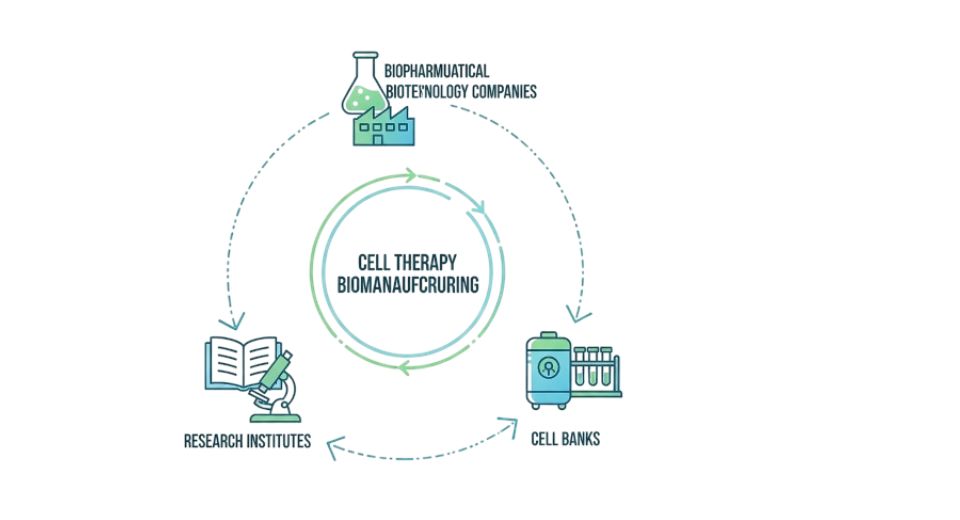
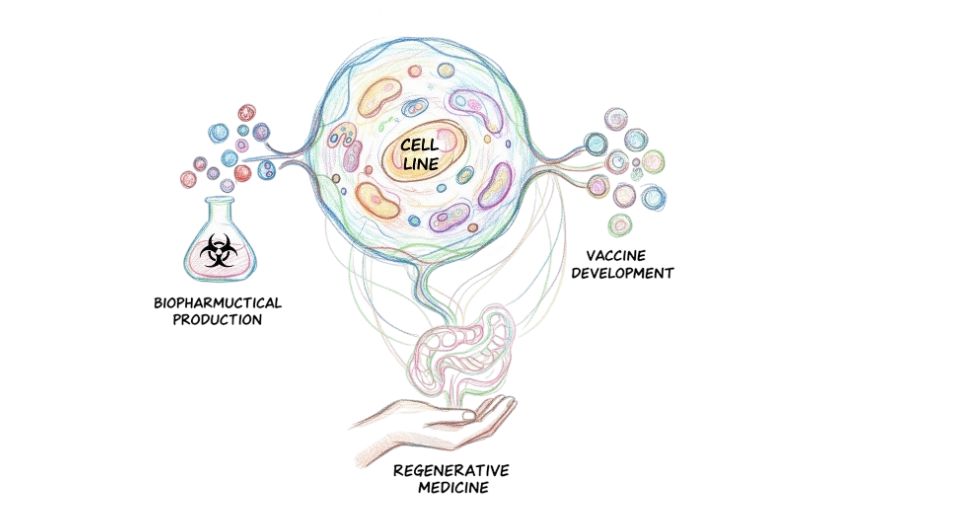

 US: +1 3023308252
US: +1 3023308252






